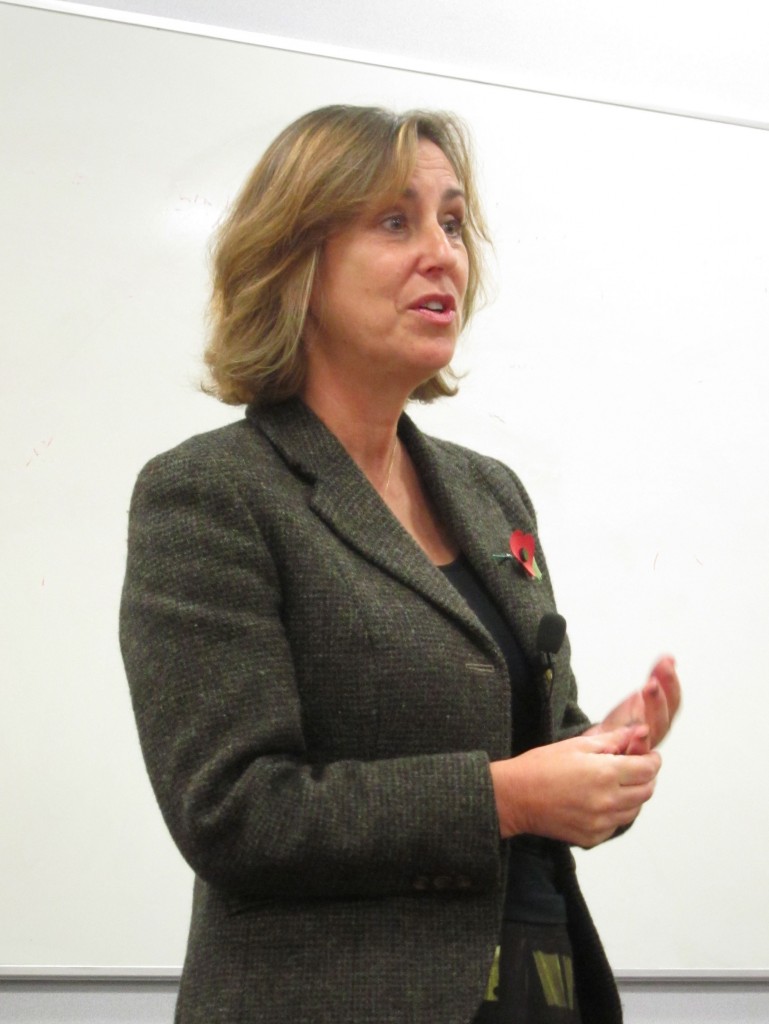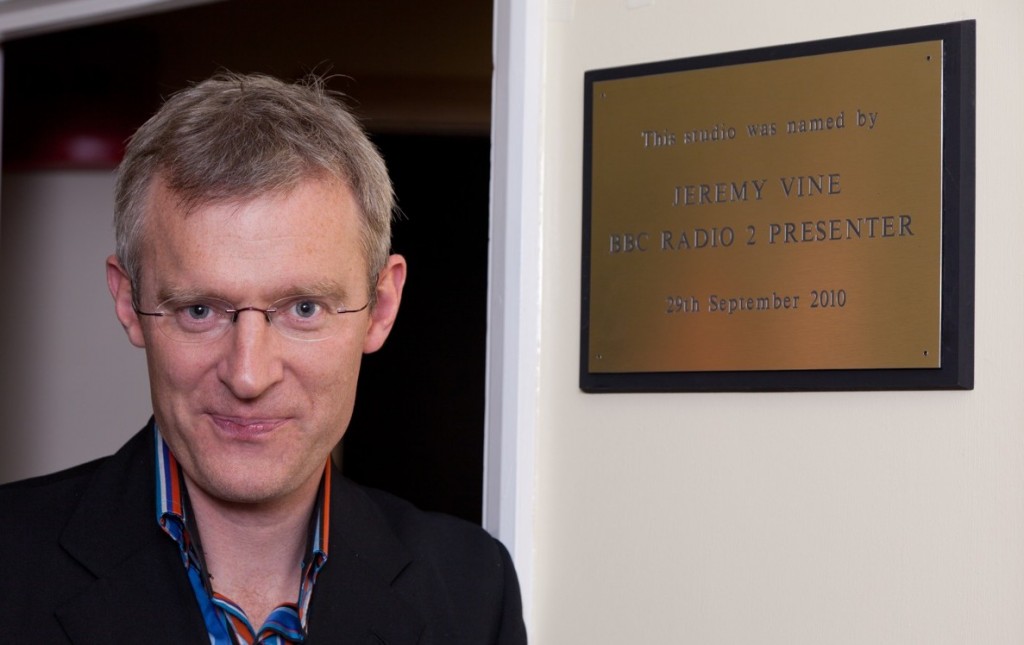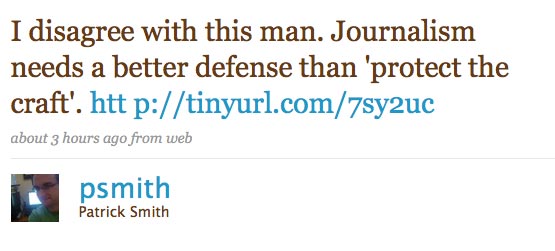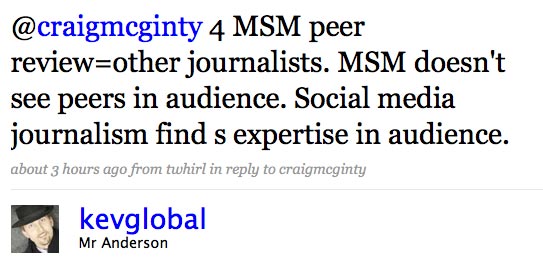As Tony Burman predicted, the ‘news channel of the year’ award at last night’s Royal Television Society awards didn’t go to Al Jazeera. Instead, it went to the BBC – who did rather well on the night in several categories. Here’s the full list, with the judges’ comments:
Young Journalist of the year: Hannah Thomas-Peter – Sky News
“A combination of fantastic access and great insight has enabled our winner to help transform health coverage on Sky News.”
Nominees: Joe Crowley – Inside Out BBC South / Kate Taunton – Channel 4 News ITN for Channel 4 News
Nations and Regions Current Affairs: The Story of Michael Barnett – Inside Out BBC Yorkshire
“A powerful programme with a sure touch…with the confidence to let the story tell itself.”
Nominees: A Friend in Need – Focus ITV Meridian / Meat Hygiene – Week In Week Out Special BBC Wales
Nations and Regions News Coverage: Weston Pier Fire – The West Tonight ITV West for ITV1
“… comprehensive, engaging and professionally presented. It had outstanding pictures and a real sense of an event which affected the whole community.”
Nominees: Boris’s Deputy – Ray Lewis Investigation BBC London News / The Darwin Trial North East Tonight for ITV1
Scoop of the Year: HBOS/Lloyds TSB Merger BBC News Channel
“… indeed ‘an extraordinary exclusive’ which heralded the extraordinary changes in the British banking system.”
Nominees: China – The Moment the Earth Shook ITV News / Canoe Man – Gerard Tubb Sky News
Presenter of the Year: Jon Snow – Channel 4 News ITN for Channel 4 News
“…yet another superb year, whether it was in the studio – interrogating politicians and bankers – or out in the field – from the Middle East to the United States. One jury member said ‘he’s just brilliant. There’s nothing more to say.'”
Nominees: Kay Burley – Sky News Sky News / Andrew Neil – BBC News
News Coverage – Home: The British Banking Crisis BBC News
“The winning entry started with a scoop of the first order and followed it with reportage and explanation of the highest quality. It was without doubt the story of the year and showed BBC News at its very best.”
Nominees: Ipswich – Guilty ITV News / Heathrow Crash BBC News
News Coverage – International: Congo Crisis ITN for Channel 4 News
“Top class coverage of a consistently high standard… It was totally comprehensive, enterprising and managed brilliantly to use small individual stories to explain the bigger picture.”
Nominees: China – The Earthquake ITV News / Conflict in the Caucasus – Newsnight BBC Newsnight for BBC Two
News Channel of the Year: BBC News Channel
“The winning news channeldelivered a fantastic series of scoops on the story of the year. It was a channel you had to watch to keep abreast of the breaking economic news.”
Nominees: Al Jazeera English News Al Jazeera English News / Sky News Sky News
Current Affairs – Home: Primark: On the Rack – Panorama BBC for BBC One
“… not only an engaging watch but… thorough and also went the extra mile to lay bare the whole chain from refugee camp to the High Street rail.”
Nominees: Omagh: What The Police Were Never Told – Panorama BBC for BBC One / The Secret Peacemaker BBC for BBC Two
Current Affairs – International: Undercover in Tibet – Dispatches True Vision for Channel 4 Television
“…a truly great current affairs film that sheds light on the future. Filmed just months before Tibet erupted into rioting, this extraordinarily brave programme, made at great personal risk and with much hardship, illuminated the tensions and troubles of the country, with powerful testimony and pictures.”
Nominees: Britain’s Most Wanted – This World Mentorn Media for BBC for BBC Two / Iraq’s Lost Generation – Dispatches Hardcash for Channel 4 Television
Innovative News: 10 Days to War – Newsnight BBC Newsnight for BBC Two
“The winning series harnessed everything from drama documentary to a special website to re-examine events leading to the Iraq war in 2003. The jury saw this as a brave and successful venture to capture a new and younger audience.”
Nominees: Unplugged Sky News / On The Frontline – Afghan Headcams ITV News
Specialist Journalist of the Year: Robert Peston – BBC News
“One journalist dominated this year’s specialist category. [He] owned the story of the Credit Crunch and its impact on the whole economy.”
Nominees: Faisal Islam – Channel 4 News/ Channel 4 News at Noon ITN for Channel 4 News / Jason Farrell – Five News Sky News for Five News
News Programme of the Year: BBC News at Ten BBC News for BBC One
“In a vintage year for news output, this programme shone through. The jury felt it had led the way on a wide range of major stories and the experience and quality of its leading correspondents had simply been unmatched anywhere else. It had triumphed on the big story of the year but had supported that with first-class reporting throughout.”
Nominees: Five News with Natasha Kaplinsky Sky News for Five News / News at Ten ITV News
Camera Operator of the Year: Garwen McLuckie – Sky News Sky News
“The winner’s work in Africa was fearless and showed a remarkable empathy for the problems faced by people across the continent. His story-telling was impressive and his work demonstrated immense personal bravery and the highest technical skills.”
Nominees: Raul Gallego Abellan – Associated Press Television News Associated Press Television News / Stuart Webb – Channel 4 News ITN for Channel 4 News
Television Journalist of the Year: Robert Peston – BBC News
“The winning correspondent produced probably the most sustained run of scoops and exclusives in the history of broadcast news in the UK… It would not be an exaggeration to say that a large part of the nation hung on the winner’s words every night – he personally revived appointment-to-view.”
Nominees: Martin Geissler – Africa Correspondent ITV News / Emma Hurd – Sky News Sky News
Lifetime Achievement Award: Peter Wilkinson
“This year’s winner is, for the first time, a cameraman. He is not a household name – but you will all recognise his work. Many of the defining moments of our era have been captured through his lens, and he is one of the true pioneers of his trade.”
Judges Awards: Zimbabwe News Teams
“[This year’s Judges’ Award] recognises and salutes the work of a disparate collection of journalists, cameramen, producers and others who work under the radar, who have helped the outside world to report and understand a major international story that would otherwise have remained largely hidden from view.”
Gold Medal: Stewart Purvis
“[The Gold Medal goes] to someone whose name may not be widely known by the public but who has influenced, directly or indirectly, virtually everything we’ve seen on screen tonight. He is, without doubt, one of the makers of modern television news.
 I knew that Kirst Wark hadn’t lost it when I saw her doorstepping Nick Clegg all the way up the aisle of Sheffield Town Hall on Election night 2010. He was not best pleased. It was then that I decided to try and get her to speak at Coventry Conversations, and last wednesday she did, delivering a masterclass for Coventry University’s journalism students.
I knew that Kirst Wark hadn’t lost it when I saw her doorstepping Nick Clegg all the way up the aisle of Sheffield Town Hall on Election night 2010. He was not best pleased. It was then that I decided to try and get her to speak at Coventry Conversations, and last wednesday she did, delivering a masterclass for Coventry University’s journalism students.

